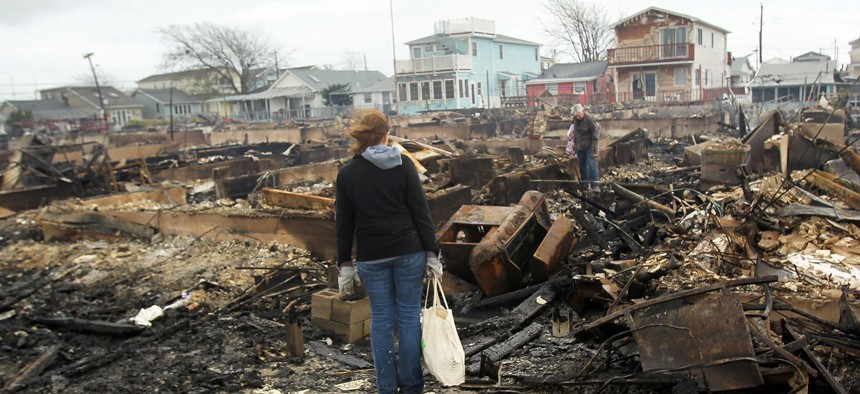Connecting state and local government leaders
COMMENTARY | A natural disaster could quickly overwhelm a voting district and render prior planning moot, so officials should plan and practice how they will conduct elections in the wake of a disaster that displaces voters, destroys blank ballots or damages election equipment.
In the days leading up to the 2012 presidential election, Hurricane Sandy hit the eastern seaboard with gale-force winds and record sea surge. Once it made landfall in New Jersey on Oct. 29, about 8 million homes were without power. Subways and highways were closed. Three nuclear power plants shut down. Floods, fires and wind killed 200 people and caused $60 billion in property damage.
The storm also caused massive disruption to the election. In New York and New Jersey, election officials scrambled to collect provisional ballots at emergency voting centers and even let voters use email and fax machines to submit their votes.
Today, many state and local elections offices have contingency plans for power outages, road closures, and poll workers who fail to turn up for their shifts. But as climate change portends more storms and other natural disasters of greater intensity, the likelihood of disruption to elections in the United States will also increase. Election officials—and American voters—must prepare now as we approach the 2024 election cycle.
The federal Election Assistance Commission identifies a variety of natural disasters local officials should plan for, including not just hurricanes, but also droughts, dust storms, earthquakes, volcanic eruptions and wildfires. With climate change, the potential scope and scale of any natural disaster could quickly overwhelm a voting district and render prior planning moot.
Imagine if the wildfires that devastated Maui last summer had occurred just before election day 2024. Thousands of people were displaced, homes burned to the ground and the search for survivors lasted for weeks. In the wake of such a disaster we would expect election officials from nearby municipalities to pitch in to help, just as emergency responders provide mutual aid for search and rescue, fires and blizzards.
A storm knocking out power to a precinct is an inconvenience, but disasters amplified by climate change can impact a wide geographical area. In October and early November, wildfires can roar across multiple western states and jurisdictions while hurricanes simultaneously bear down on the eastern coast.
Such circumstances would require more than setting up one-time alternate voting centers. In the wake of the November 2018 Camp Fire in California, for example, local election officials had to reach voters who had evacuated to other parts of the state, to neighboring states and in some cases across the country. After Hurricane Katrina in 2004, the Louisiana secretary of state worked to contact voters dispersed across 14 states.
Even with predictable and trackable events such as seasonal hurricanes, the scale of devastation is not always easy to anticipate. That means election officials must always be prepared for a larger scale and level of impact. Their planning should include how to respond to “mega events,” not just localized issues. Health and safety concerns will be the primary responsibilities for first responders and emergency managers, but the preservation of democratic processes should also be addressed.
As a start, governors and state legislatures need to review and revise the emergency powers that governors and election directors (typically a secretary of state, though not always) can exercise following a disaster. For example, the governor of Louisiana—if the secretary of state concurs—has the power to delay an election after a declaration of a public emergency. But as seen with the COVID pandemic in 2020, legal challenges and disputes between governors and legislators abounded, particularly in states where power was split between the two parties. Citizens might expect the two sides to agree on election contingencies in case of a natural disaster, but in this era of hyperpartisanship, it would be infinitely better to hash out the details now.
When a natural disaster hits, many voters will not have foreseen the potential need to request an absentee ballot or vote early, so states also should examine whether they have sufficient alternative means for voters to cast their ballots early, whether by mail or in-person. Alabama, New Hampshire and Mississippi do not allow early in-person voting at all, for example, and other states have short early voting periods. Some states that allow for absentee voting have cut-off dates a month or more before election day. These policies should be reviewed.
Without robust plans, election officials will have to scramble to communicate how and where displaced voters can cast ballots or receive them if vote-by-mail or absentee ballots are available. Despite their best efforts, disasters will likely depress voter turnout. For families who have lost loved ones and their homes, election officials should do their utmost not to compound the disaster’s impact by inadvertently disenfranchising voters, particularly those in vulnerable populations who are the least likely to have the means and opportunity to participate in elections when they’ve been displaced.
Congress could act as well. It might, for instance, see how Help America Vote Act funds could be allocated to states and local jurisdictions to bulk up their ability to respond to disasters. Elections offices would benefit from setting up contingency contracts to reprint and distribute ballots, buying and certifying additional election equipment and running robust planning and exercises through the Cybersecurity and Infrastructure Security Agency.
The spectrum of threats to our democracy and elections has expanded in recent years, from concerns over basic cybersecurity to foreign influence campaigns and now artificial intelligence risks. These all require continued attention, but the increase in the number and intensity of natural disasters is no less a grave risk.
Quentin E. Hodgson is a senior researcher at the nonprofit, nonpartisan RAND Corporation. He has published research on cybersecurity of elections infrastructure and planning for elections during the COVID-19 pandemic.

NEXT STORY: Do land-use reforms spur housing development? You betcha.



